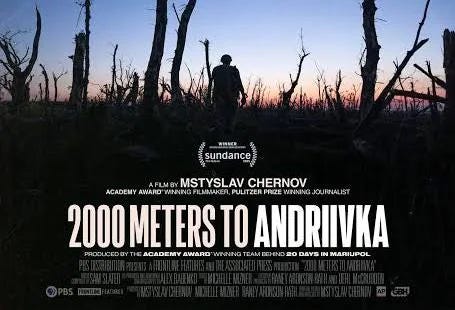Kent Brockman: “The wars of the future will not be fought on the battlefield, or at sea. They will be fought in space… or possibly on top of a very tall mountain. In either case, most of the actual fighting will be done by small robots… and as you go about your daily lives, the key is to just try not to notice.”
(Bart’s Comet, S6E14)
I recently watched 2000 Meters to Andriivka at the Roxie Theater in San Francisco. After the screening, director Mstyslav Chernov held a Q&A. The film itself is restrained: it avoids heavy-handed commentary and instead lets the audience experience the brutal reality of trench warfare through Chernov’s embedded reporting with Ukrainian troops.
That restraint is powerful, but it also means the film leaves much unsaid. For viewers not already steeped in the politics and strategy of the war, the main impressions could be limited to “war is hell” and “this is a stalemate.” Those impressions are not wrong, but they risk flattening the bigger picture.
Here are a few points I think are important for Americans — especially those sympathetic to Ukraine — to keep in mind:
U.S. policy has been too slow.
In retrospect, the Biden administration’s military assistance ramped up cautiously, with key systems like tanks, air defense, and long-range missiles arriving later than Ukraine needed. That delay almost certainly cost lives and may have reduced Ukraine’s chances of regaining territory. Earlier, stronger deterrence might also have complicated Putin’s decision to invade.Ukraine’s manpower is finite.
While the Ukrainian public remains strongly opposed to territorial concessions, there is no guarantee that Ukraine will always have the soldiers it needs to sustain the fight. Americans rarely grapple with what a Ukrainian collapse would mean for European and U.S. security.A bad peace could be worse than continued war.
Polling shows a wide gap between Putin’s demands and what Ukrainians find acceptable. Forcing Ukraine into a coerced settlement risks creating an unstable “peace” that invites future aggression.Russia’s war economy runs on oil and gas.
Despite sanctions, Russia continues to earn substantial revenues from energy exports. Western governments, wary of spiking global oil prices, have not fully cut into this lifeline. This hesitancy sits uneasily beside claims that climate change is an existential threat.
Chernov’s film doesn’t aim to walk audiences through these policy dilemmas — nor should it have to. Its purpose is to bring the war’s reality to the screen. But as Americans absorb that reality, we also need to connect it to the choices our own government faces.

